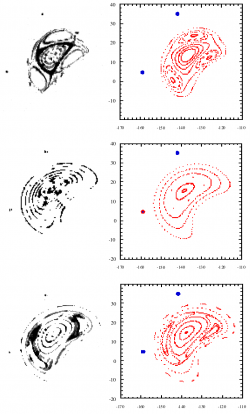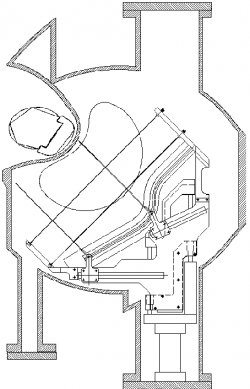TJ-II:Magnetic surface mapping: Difference between revisions
Jump to navigation
Jump to search

mNo edit summary |
mNo edit summary |
||
| Line 9: | Line 9: | ||
<ref name="Fraguas">[http://www.rsphysse.anu.edu.au/admin/stellarator/papers/LFraguas_PI6.pdf A. López Fraguas et al, ''Magnetic surface mapping experiments in TJ-II'', Proc. 13<sup>th</sup> International Stellarator Workshop (Australia, 2001) P1-6]</ref> | <ref name="Fraguas">[http://www.rsphysse.anu.edu.au/admin/stellarator/papers/LFraguas_PI6.pdf A. López Fraguas et al, ''Magnetic surface mapping experiments in TJ-II'', Proc. 13<sup>th</sup> International Stellarator Workshop (Australia, 2001) P1-6]</ref> | ||
[[File:TJ-II_Surfaces.png|250px|thumb|left|Flux surfaces. Left column: measured. Right column: calculated. Top row: n=4, | [[File:TJ-II_Surfaces.png|250px|thumb|left|Flux surfaces. Left column: measured. Right column: calculated. Top row: n=4, m=3. Middle row: n=8, m=5. Bottom row: n=3, m=2. <ref name="Fraguas" />]] | ||
== References == | == References == | ||
<references /> | <references /> | ||
Latest revision as of 17:50, 21 March 2012
After construction of TJ-II was completed, the accuracy of the magnetic field was checked by measuring the vacuum flux surface mapping and comparing to theoretical predictions. The mapping was done at a magnetic field strength of 10% of the nominal value. The detection process involved imaging [1] the spots produced by electrons, emitted from an electron gun, when these intersected an array of fluorescent rods that swept the vacuum vessel cross section. [2] The agreement was found to be good. [3]

Flux surfaces. Left column: measured. Right column: calculated. Top row: n=4, m=3. Middle row: n=8, m=5. Bottom row: n=3, m=2. [3]
References
- ↑ J. Marin et al, Real time image integrator for magnetic surface mapping experiments in TJ-I U torsatron, IEEE Trans. Nucl. Science 43, 1 (1996) 234
- ↑ E. Ascasíbar et al, Magnetic surface mapping experiments in TJ-II Heliac, J. Plasma Fusion Res. SERIES 1 (1998) 183
- ↑ 3.0 3.1 A. López Fraguas et al, Magnetic surface mapping experiments in TJ-II, Proc. 13th International Stellarator Workshop (Australia, 2001) P1-6
